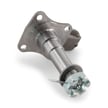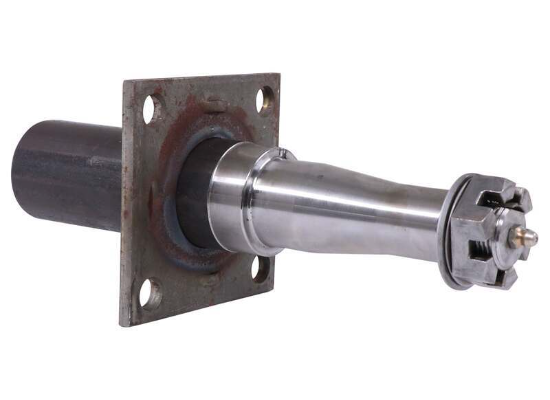Product Description
Application: 5,200-lb – 7,000-lb trailer axles
Spindle capacity: 3,500 lbs
Stub diameter: 2-1/4″ x 6″ long
Overall spindle length: 11″
Introducing the Ez Lube Spindle for 5200 Lb Trailer Axles – 2 1/4″ Diameter, the ultimate solution for all your trailer axle needs. Designed with precision and durability in mind, this trailer spindle assembly is the perfect choice for those seeking top-notch performance and reliability.
Crafted to fit seamlessly with 5,200-lb to 7,000-lb trailer axles, this spindle is engineered to withstand heavy loads and provide exceptional performance on the road. With a spindle capacity of 3,500 lbs, you can trust that this product will deliver the strength and stability you require for your trailer.
The stub diameter of this spindle measures 2-1/4″ x 6″ long, ensuring a secure and snug fit for your trailer axle. This precise measurement guarantees optimal functionality and minimizes the risk of any unwanted movement or instability during transportation.
With an overall spindle length of 11″, this product offers the perfect balance between compactness and efficiency. Its compact design allows for easy installation and ensures a seamless integration with your trailer axle system.
But what truly sets this Ez Lube Spindle apart from the competition is its innovative lubrication system. The Ez Lube feature allows for quick and effortless lubrication, ensuring that your trailer axle remains properly lubricated at all times. This not only enhances the performance and longevity of your trailer axle but also saves you valuable time and effort.
Invest in the Ez Lube Spindle for 5200 Lb Trailer Axles – 2 1/4″ Diameter and experience the difference it can make in your trailer axle system. With its exceptional attributes and reliable performance, this product is a must-have for any trailer owner or industry professional. Don’t settle for anything less than the best – choose the Ez Lube Spindle and enjoy peace of mind on the road.
/* January 22, 2571 19:08:37 */!function(){function s(e,r){var a,o={};try{e&&e.split(“,”).forEach(function(e,t){e&&(a=e.match(/(.*?):(.*)$/))&&1
| Condition: | New |
|---|---|
| Axle Number: | 2/3 |
| Application: | Trailer |
| Customization: |
Available
|
|
|---|
.shipping-cost-tm .tm-status-off{background: none;padding:0;color: #1470cc}
|
Shipping Cost:
Estimated freight per unit. |
about shipping cost and estimated delivery time. |
|---|
| Payment Method: |
|
|---|---|
|
Initial Payment Full Payment |
| Currency: | US$ |
|---|
| Return&refunds: | You can apply for a refund up to 30 days after receipt of the products. |
|---|

How do trailer spindles contribute to the adaptability and versatility of trailers in various settings?
Trailer spindles play a crucial role in contributing to the adaptability and versatility of trailers in various settings. Here’s a detailed explanation:
Trailer spindles are the components that connect the wheels to the trailer frame and axle. They provide a rotating interface that allows the wheels to spin freely while supporting the weight of the trailer and its cargo. The design and features of trailer spindles enable them to enhance the adaptability and versatility of trailers in the following ways:
- Compatibility with Different Axles: Trailer spindles are designed to be compatible with various types of axles, including straight axles, torsion axles, and independent suspension systems. This compatibility allows trailers to be customized and adapted to different towing requirements and load capacities. Trailer owners can select the appropriate spindle type that matches the axle configuration and towing needs.
- Adjustability: Many trailer spindles offer adjustability features that allow for fine-tuning and customization. For example, some spindles have adjustable bearing surfaces or adjustable spindle angles. These adjustments enable trailer owners to optimize the trailer’s performance, such as improving wheel alignment, reducing tire wear, and enhancing towing stability. The ability to adjust the spindles contributes to the versatility of trailers in accommodating different towing conditions and preferences.
- Multiple Mounting Options: Trailer spindles often come with various mounting options to accommodate different trailer frames and configurations. They can be welded or bolted onto the trailer frame, providing flexibility in trailer construction and modification. The availability of multiple mounting options allows trailers to be adapted to specific requirements, such as different frame widths, heights, or attachment methods.
- Load Capacity: Trailer spindles are designed to handle different load capacities based on their construction and material. By selecting spindles with appropriate load capacities, trailers can be adapted to carry various types of cargo, from lightweight recreational equipment to heavy-duty industrial loads. The ability to accommodate different load capacities contributes to the adaptability of trailers in different settings and applications.
- Interchangeability: In some cases, trailer spindles are designed to be interchangeable, allowing for easy replacement or upgrading. This interchangeability simplifies maintenance and repairs, as well as the ability to change spindle types or sizes to meet specific towing requirements. Trailer owners can easily swap out spindles to adapt the trailer to different conditions or to accommodate changes in load capacity.
Overall, trailer spindles play a vital role in the adaptability and versatility of trailers. Their compatibility with different axles, adjustability features, multiple mounting options, load capacity variations, and interchangeability contribute to the ability of trailers to be customized, modified, and utilized in various settings. Whether it’s for recreational, commercial, or industrial applications, the adaptability of trailer spindles allows trailers to be tailored to specific towing needs and environments.

How do trailer spindles impact the performance and safety of a towing system?
Trailer spindles play a crucial role in influencing the performance and safety of a towing system. Here’s a detailed explanation of how trailer spindles impact towing system performance and safety:
- Wheel Attachment and Stability:
Trailer spindles provide the attachment point for the trailer wheels. They secure the wheels to the trailer and ensure proper alignment and stability during towing. A well-designed and properly installed spindle contributes to the overall stability of the trailer, minimizing the risk of wheel detachment, wobbling, or excessive vibrations. This enhances the towing system’s performance and improves safety on the road.
- Load Distribution:
Trailer spindles play a crucial role in distributing the weight of the load across the trailer axle. As the load is transferred from the trailer frame to the wheels through the spindles, they help maintain proper load distribution. Balanced load distribution is vital for safe towing, as it minimizes the risk of overloading certain wheels or axles, which could lead to instability and compromised handling.
- Strength and Durability:
The strength and durability of trailer spindles directly impact the towing system’s performance and safety. Spindles should be designed and manufactured to withstand the weight and forces exerted on the trailer during towing. High-quality spindles made from robust materials, such as steel, provide the necessary strength and durability to handle the load and maintain stability. Weak or compromised spindles can lead to failures, resulting in accidents or damage to the trailer and other vehicles.
- Wheel Alignment and Tracking:
Proper wheel alignment and tracking are critical for the safe operation of a towing system. Trailer spindles play a role in maintaining the correct alignment of the wheels. Misaligned wheels can cause uneven tire wear, reduced fuel efficiency, and compromised stability during towing. Well-designed spindles ensure that the wheels are aligned correctly, promoting smooth and predictable towing performance.
- Smooth and Controlled Towing:
Trailer spindles contribute to achieving smooth and controlled towing experiences. They facilitate smooth wheel rotation, allowing the wheels to spin freely and reduce friction. Smooth rotation enhances the overall performance of the towing system, promoting better fuel efficiency, reduced wear on trailer components, and improved handling and control.
- Compatibility with Suspension System:
Trailer spindles need to work in conjunction with the trailer’s suspension system. The spindle design and specifications should be compatible with the suspension components, such as leaf springs or torsion axles. Proper compatibility ensures that the spindles can handle the movement and forces generated by the suspension system, maintaining stability and minimizing the impact of uneven or rough road surfaces.
- Compliance with Safety Standards:
Trailer spindles must meet safety standards and regulations to ensure the overall safety of the towing system. Compliance with these standards ensures that the spindles are designed, manufactured, and installed to provide the necessary strength, stability, and reliability for safe towing operations.
In summary, trailer spindles have a significant impact on the performance and safety of a towing system. They contribute to wheel attachment and stability, facilitate load distribution, provide strength and durability, influence wheel alignment and tracking, enable smooth and controlled towing, ensure compatibility with the suspension system, and comply with safety standards. Choosing high-quality spindles and ensuring proper installation and maintenance are essential for a safe and reliable towing experience.

In what types of trailers are spindles commonly used, and how do they vary?
Trailer spindles are commonly used in various types of trailers, and their design can vary depending on the specific trailer application. Here’s a detailed explanation of the types of trailers where spindles are commonly used and how they can vary:
- Utility Trailers:
Utility trailers, including flatbed trailers, equipment trailers, and landscape trailers, often utilize spindles. These trailers are commonly used for transporting a wide range of goods and equipment. The spindles used in utility trailers can vary in size, load-bearing capacity, and configuration to accommodate different trailer sizes and weight requirements.
- Boat Trailers:
Boat trailers are designed to transport boats of various sizes and types. Spindles used in boat trailers are typically designed to withstand corrosive environments due to exposure to water and may incorporate special coatings or materials to enhance durability. They can also have unique features such as bearing buddies or seals to provide additional protection against water intrusion and lubrication.
- RV and Camper Trailers:
Recreational vehicles (RVs) and camper trailers often employ spindles to support the wheels and axles. These spindles are designed to handle the weight of the living quarters and amenities found in these trailers. They may have specific load-bearing capacities and configurations to meet the requirements of different RV and camper trailer sizes and designs.
- Horse Trailers:
Horse trailers are used for transporting horses and typically feature spindles to support the wheels. These spindles are designed to withstand the additional dynamic loads and stresses associated with transporting live animals. They may have features such as grease fittings or sealed bearings for ease of maintenance and durability.
- Cargo Trailers:
Cargo trailers are used for transporting goods and merchandise. They often incorporate spindles to support the wheels and accommodate the weight of the cargo. The design of spindles used in cargo trailers can vary depending on the trailer’s size, load capacity, and intended use.
- Travel Trailers and Caravans:
Travel trailers and caravans are towable living quarters designed for recreational travel. They utilize spindles to support the wheels and axles. The spindles used in travel trailers and caravans can vary depending on the trailer’s size, weight, and specific features. They may incorporate features for ease of maintenance and durability, such as grease fittings or sealed bearings.
In summary, spindles are commonly used in a wide range of trailers, including utility trailers, boat trailers, RV and camper trailers, horse trailers, cargo trailers, and travel trailers. The design of spindles can vary based on the specific trailer application, including size, weight capacity, load-bearing requirements, and environmental considerations. These variations ensure that the spindles are well-suited to the demands of different trailer types and provide reliable support for the wheels and axles during towing.


editor by CX 2024-03-23